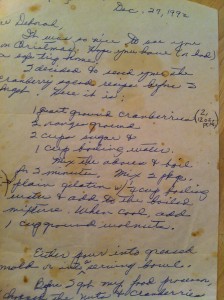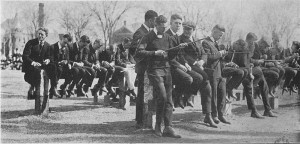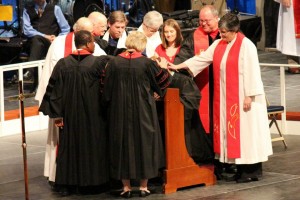
A sermon on Jeremiah 31: 1-3a, 6-15 preached at Wesley Memorial UMC during Family Weekend at UVA.
I sit through a lot of meetings and read a lot of articles about The State of the Church. As you may have heard, we are older, we are smaller, our buildings are in need of repair, and we aren’t as flush as we used to be. I’m not seeking out these meetings and articles – they are hard to escape. A vocal and vigilant group of church Chicken Littles wants to make sure everyone else knows the sky is falling.
In a lot of the church we have decided the way to “fix” our problems is to frantically recruit young people, to become less building-focused, and to count everything. Most of the angst and worry seems to be backward-looking – how can we have church like we did in 1958 when, if you wanted to fit in to polite society church is just what you did and there were fewer distractions like Netflix or Sunday soccer, and people had more time since only 1 person in the couple worked (guess which one? and everyone was in a couple)?
What if, instead of the articles and hand-wringing conferences about the dearth of young people in church, we the church took that missing group seriously enough to find out where they are instead? What’s Sunday like for them? Weekends? Family life? Why? What’s spirituality like for them? Tell me more about it. Help me understand you. And, what if we didn’t do this as a ploy to pull them “back” into church, but because it’s the kind of thing Jesus would do – seeking out the people overlooked or despised by the religious authorities and treating them as children of God, brothers and sisters…
I can hear the Chicken Littles now. But we don’t have time for that! We need someone to lead the youth group now. We need to build a better budget and those young folks are the workers now. We don’t have time to sit around and listen to their lives – we were young once, we remember what it was like – and, besides, the sky is falling!
Have you noticed how the most faithful, God-oriented moments in life are often the ones that, on the surface, make no sense? Do you have some of those in your life? In my own life, I once drove several hundred miles out of my way to see a guy I’d had only two dates with – and who ended up becoming my husband. God calls to us across the strange terrain of long road trips and unexpected random acts of kindness and the seemingly strange last-minute switches of your major or you career. Often these moments and decisions don’t seem like wise choices to the onlookers in our lives.
They can even seem foolhardy or wasteful. Like trying to stretch 7 loaves and 2 fish to feed 5000. Like leaving 99 sheep on their own in order to go find the one who’s lost. Like standing on a hillside proclaiming that the meek will inherit the earth.
Or, like buying real estate in the middle of a war zone.
In a city under siege at that very moment, with the Babylonians pounding at the gates and about to conquer Jerusalem and capture its people, God instructs Jeremiah to buy a plot of land. If ever there was Chicken Little territory this was it. The sky may not have been falling but the walls were crumbling, the gates were giving way, and armies were on the move. Jeremiah himself has been warning the people for 31 chapters by this point – warning them to turn from their idolatry and come back to the one true God. Then, at the moment when all he’s been saying is in the process of coming true, God tells him to buy a field right in the middle of all that turmoil, chaos, and heartbreak.
And God tells Jeremiah to put the deed in a jar so it will “last for a long time… [because] Houses and fields and vineyards shall again be bought in this land” (32: 15). It’s a bet on the future, grounded in the hope of God’s promise that even this sad and forlorn day is not the end of the story. It’s also a metaphor for our hearts, upon which this promise has been written. The fertile soil of our hearts will be purchased, developed, and rebuilt by God.
I think this is one of the most radical, hope-filled moments in the entire Bible…. To purchase a piece of land that’s already been captured, as you are about to be captured next – while proclaiming God is up to something good. If we were to set it today’s world, it might look like a prisoner who studies for her GED and works on her resume even though she has 20 more years to go on her sentence. It might look like a Syrian teenager applying to college with rockets overhead and gunmen on the corners. It might look like a small church with a shrinking budget investing in people who aren’t members.
What a flimsy-seeming sign of hope – a slip of paper bought in a war zone. Flimsy and vulnerable, like a baby born in a stable.
This is the way God works: with what seems small or meaningless or not quite enough – and with the long view. Jeremiah had a deed but there was a long way to go before the houses and vineyards would sprout up on that land. Mary had a baby but it was a long time before the world could see it had a savior.
This is the way hope works: It’s about choosing to believe that God makes good on God’s promises and that we will never be left to our own devices.
The Chicken Littles may think the church has the deed to a worthless plot of decaying buildings and rundown property. No matter what it looks like from here, the truth is God’s given us a field and a promise. We don’t have to just wait for the vineyards to appear – we can help plant them.
We can live in bold hope during uncertain times. Hope is not the same thing as wishing. Wishing takes us backward to the way things used to be or into our own imagination, where we concoct what we think would be a better future. Hope, on the other hand, takes us into God’s imagination, offering a glimpse so we’ll recognize it when it gets here…a taste so we are hungry for it. Hope means behaving now as if what God promises is already happening – because it is.
The vineyards and new houses are waiting for us. Do you see them? We can reacquaint ourselves with our neighbors, simply because they are our neighbors. We can go, like Jesus, to where the people are and consider that perhaps we are the ones who need to change in order for the church to work. We may be called on to spend the last dollar we have on a field in this war zone. Or on taking a student to coffee when there is no time to waste and no line item in the budget for that kind of thing.
I happen to work in part of the church where we are flush with young people. I also happen to work in part of the church that relies on the rest of the church for support. So, believe me, I understand the dilemma and I feel the pinch. But I need to point out this obvious fact: we do have some young people. Excellent, passionate, faithful disciples who happen to be under 25. So while I do think we need to pay attention to who isn’t here and go out to them and learn about them and figure out how to be better neighbors to them….I also think we need to pay better attention to those who are already here.
A few years back I was talking with our Wesley Foundation student president at the time. She had been involved and in leadership at Wesley her entire time in college. Because she came from one our district churches, that church was even involved in helping to bring food for Thursday night dinners – so they saw firsthand what she was up to here at UVA and they obviously supported campus ministry. But she told me once that what she loved most about the Wesley Foundation was she could actually do things and lead things here. She said, “At my home church they would never let me lead anything.” They had a young, faithful, creative person who’d honed her leadership here in college but who wouldn’t have been asked to join the Trustees at her own church. She hadn’t served her time to work up to that position. She needed to pay her dues and listen to her elders a while longer. That right there is a failure of imagination on the part of her church. That’s a church that would rather believe in their own abilities to raise a few sour grapes in captivity than believe that God had already purchased a piece of land for a bountiful vineyard.
Let me be clear here: we are all in this together. We are all called to become better neighbors to those in our midst – not just to those in our pews. Students and young people, you are not off the hook when the church’s imagination is impoverished and they don’t listen to your ideas or make you head of something the moment you arrive. You are also called to invest in this strange war-torn piece of land, to seek out new neighbors. Who do you see without seeing in your daily rounds of Grounds? Whose name do you need to learn at the social hour after church? Where will you invest with hope?
If I wanted to be crankier than I already am, I could spend a lot of time shooting down student ideas and telling them how we tried that once 20 years ago. Or I could worry more about whether the church will continue to fund campus ministry.
But I choose hope.
The church will not look like it did 50 years ago 50 years from now – or even in 5. And I think that’s a good thing. God is doing a new thing. God has a slip of paper with our names written on it and it’s more important and valuable than all that pounding at the gate and chunks of sky falling to the ground. There is more to come. God is not done with the church or young people or any one of us yet. Just you wait for the next chapter! And, while you’re waiting, how about asking the Starbucks barista what his life is like? How about taking a student to coffee?
Thanks be to God!











